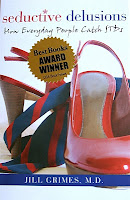
Here is a terrific study for the forty-somethings, recently published in the Annals of Internal Medicine. The Study is titled: Weight and Metabolic Outcomes After 2 Years on a Low-Carbohydrate Versus Low-Fat Diet; A Randomized Trial. The trial took around 300 people in their mid-30s to mid-50s, and placed them all in a COMPREHENSIVE BEHAVIORAL TREATMENT for weight loss. Half the group consumed a low-carb diet with unrestricted fat and protein, and the other group ate a low-fat diet (<30% calories from fat.)
Their weights were measured frequently, but the end goal was weight loss maintained at two years. Interestingly enough, BOTH groups had the same amount of weight loss- a whopping 24.2 pounds at one year, and a respectable 15.4 pounds were kept off at two years. Both groups had improvements in their blood pressure and lipid levels (cholesterol), and the low-carb group maintained higher HDLs (the GOOD cholesterol that goes around the bloodstream and takes away cholesterol plaques) even at the two year mark.
Now, these participants started off "healthy"- no diabetes or scary cholesterol levels, but all were obese by BMI (body mass index) criteria. Not everyone finished the study, but those that did complete it had great health benefits.
Take home message for you?
BOTTOM LINE: Feel free to choose "low fat" or "low carb" if that helps direct you, but changing BEHAVIORS (see the "MORE" posts!) including more physical activity and more healthy food choices of fruits and vegetables are the most important component of ANY diet!




















